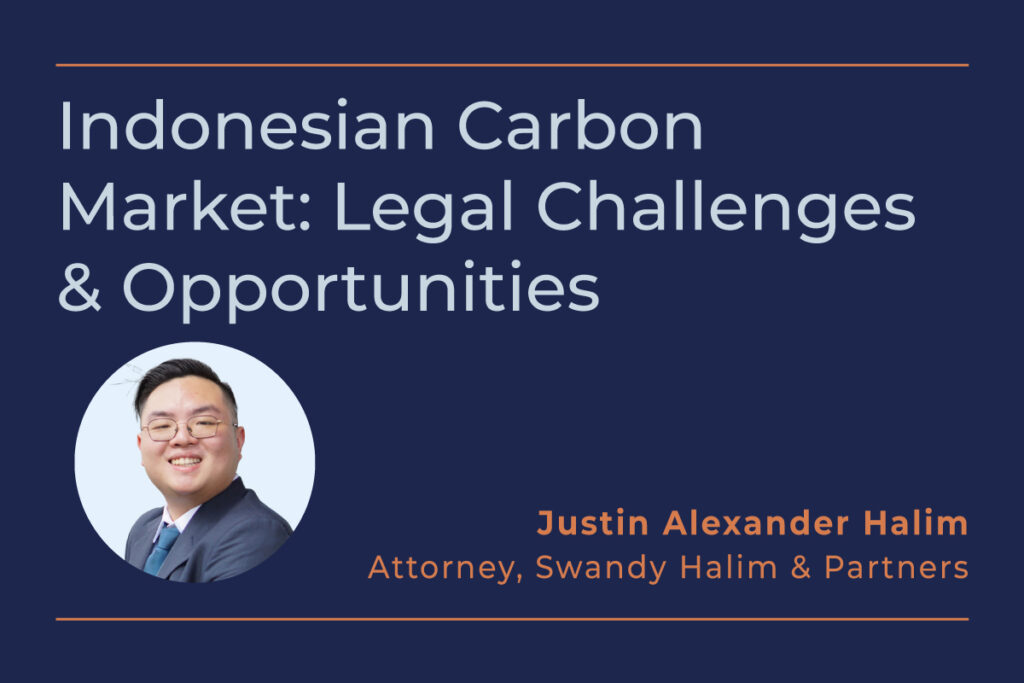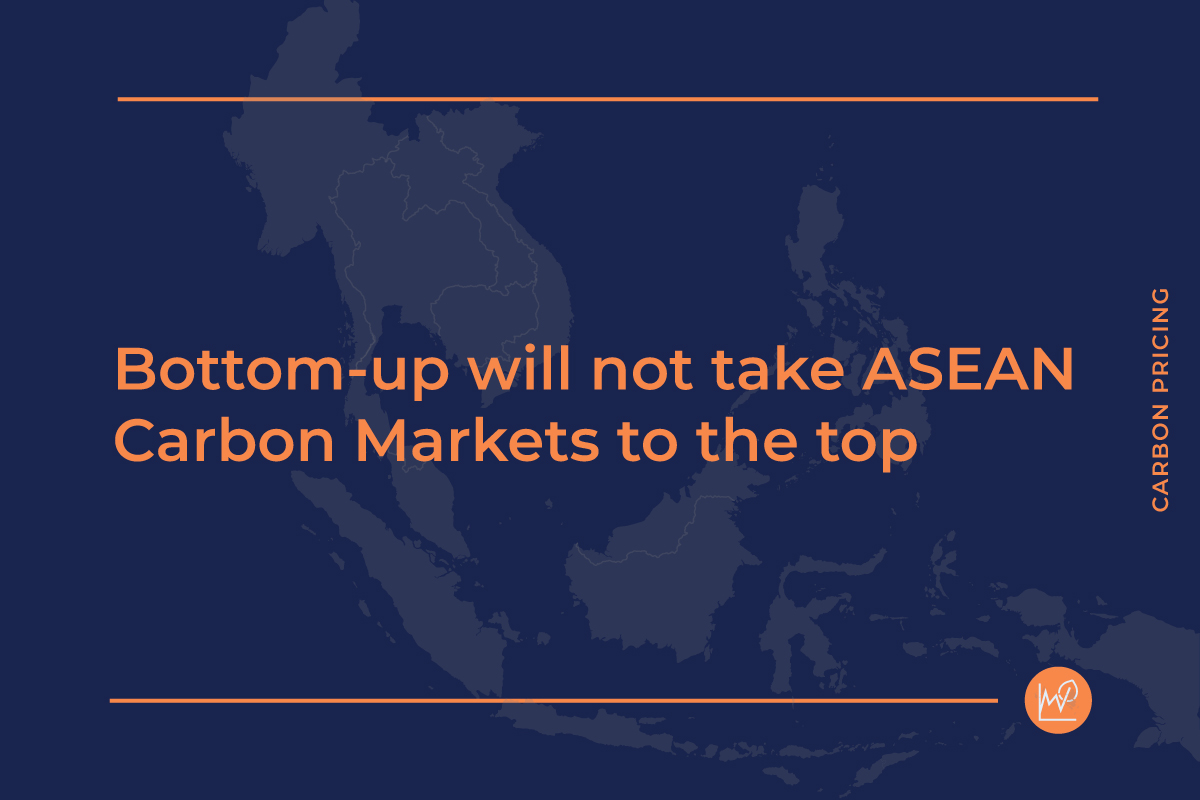Question: Your firm is known as a boutique legal disputes firm with a focus on the carbon market. Could you share a bit about your background and what led you to specialize in this area of law?
As a disputes firm, we regularly handle administrative disputes concerning private sector clients dealing with government agencies. While we initially started out with disputes arising from the financial sector, this eventually branched out into other sectors ranging from telecommunications, energy and most recently, carbon markets.
While we have traditionally seen a focus on business actors securing large concession areas to extract commodities such as timber and palm oil, we now see a growing trend of actors shifting their focus to secure concession areas to develop carbon projects instead. Understanding the nuances and risks surrounding the granting and maintenance of these concessions, which comes in the form of a Ministerial Decree, we foresee the emergence of disputes in this area of law.
Q: Carbon pricing and the carbon market are still relatively new in Indonesia. What are some of the unique legal challenges that arise when representing clients in disputes within this rapidly evolving market?
The lack of policy certainty has thus far become the biggest challenge in representing our clients. For background, the Indonesian government only started implementing carbon pricing regulation in late 2021 through the enactment of Presidential Regulation No.98 Year 2021 on Carbon Economic Value.
Despite only having been in force since 2021, the government has enforced this regulation too expansively, meaning to say that the current case we handle on carbon markets has the government alleging wrongdoing for justifiable actions that were performed prior to the enactment of the Presidential Regulation on Carbon Economic Value.
Apart from this, when a carbon project is appealing, there may emerge vested interests that are keen to intervene in the decision-making process at the ministerial level, insofar that administrative actions such as license revocation becomes a politically motivated case compared to a pure law enforcement issue.
Apart from this, one must also help clients carefully navigate the transition towards the new government. A simple example being mapping the regulatory powers of the new ministries and agencies that are tasked with regulating carbon markets. If just a few months ago we had a single regulator for forestry and other land use projects (re : Ministry of Environment and Forestry), we now have the Ministry of Forestry, the Ministry of Environment in addition to the newly formed National Carbon Agency.
Q: The regulatory framework surrounding carbon markets can be complex and often unclear. How does your firm navigate the existing legal landscape, and what are the key regulatory concerns that clients face in this space?
Our firm strives to be at the forefront of the legal framework surrounding carbon markets.
We have paired our knowledge management capabilities from Indonesia’s largest legal intelligence service provider (including the use of Artificial Intelligence) with our own internal analysis of these regulatory updates. Our frequent contact with clients in the energy and FOLU sector has also meant that they fill the gaps wherever there are regulatory and/or administrative legal documents that have not been widely publicized by the relevant government agency.
It goes without saying that gauging these laws and regulations in practice requires another round of efforts. This is where our active participation in discussion forums and engaging with industry players form a key role in measuring whether or not the policy has been effectively and uniformly implemented across the sector.
The main concerns in this space include the transparency in the timeline of registration in the MOEF administered National Registry System for Climate Change Control (SRN-PPI) in addition to the ongoing moratorium of sale of offset units which has been in place since May 2021.
Q: Could you provide an example of a case or legal dispute your firm has handled related to carbon pricing or emissions trading? What were some of the legal strategies employed, and what was the outcome?
We are currently handling the license revocation matter for the largest Indonesian project developer by number of VCU issuance.
Our strategy is simple, to provide every piece of evidence that have established the relationship between our client and the ministry to prove that our client has remained fully compliant with its obligations which the government argues otherwise.
To achieve this, we engaged renowned experts to provide written testimony on a number of administrative and environmental policies surrounding the government’s administrative action. Apart from this, we provided detailed documentation on the work our client has performed on the ground, which was further strengthened by direct court testimony by their operations team to evidence the level of contribution the client has provided for the communities, environment and overall well-being of the region they operate in.
Fortunately, these efforts have been met with a positive verdict in our behalf in both the first instance and appellate court. We are now still defending the case against a further cassation appeal by the minister to the Supreme Court.
Q: As carbon markets in Indonesia continue to grow and mature, how do you see the legal environment evolving? What are some of the key legal and regulatory developments you anticipate, and how might they shape future disputes?
As the current state of carbon markets remains nascent and the regulatory framework being convoluted, the only way is upwards. We remain cautiously optimistic on the incoming administration’s ambition to designate carbon markets as a priority sector. Nevertheless, the evolving legal landscape will continue to present the emergence of disputes, both administrative and commercial in nature.
Firstly, we can expect to see friction amongst the different government agencies vying for influence over policymaking on carbon markets. Knowing that the sector is promising in terms of government revenues, the agencies mentioned above risk spearheading their own measures without proper coordination with the other, putting stakeholders at risk of the eventual outcome. To see an example of this, one need not look far from the current state of the Indonesia Stock Exchange’s carbon bourse, dubbed IDXCarbon. To date only three projects have been listed on the carbon exchange, none of which include a FOLU project.
We should continue to expect a higher demand from business actors for carbon project eligible concession areas. In the FOLU sector, with the enactment of Ministry of Environment and Forestry Regulation No. 7 Year 2023, the scope of forests eligible for carbon projects has expanded to not only include production forests (Hutan Produksi), but also other forest categories such as social forests (Perhutanan Sosial) in addition to customary forests (Hutan Adat). While the latter category of forests are intended to provide direct benefits for indigenous/local communities to engage in carbon markets, there is potential for misuse of these forest categories by business actors intending to take a shortcut in securing concession areas, rendering it prone towards law enforcement.
Indonesian mainstream media has also reported on the classic issue of land grabs by corporations in areas with high carbon potential for the purpose of developing carbon projects. Therefore, we expect to see these types of land conflicts to continue occurring, especially in areas where there is minimum oversight from the central government and resistance by local communities.
As Indonesian carbon markets grow and marketplace transactions for offset units increase, so will the likelihood that plain vanilla offset unit transactions will lead to commercial disputes. This comes as the Financial Services Authority has also not set a standard template for emissions reductions purchase agreements or its agreements governing offset derivatives.
It is therefore important for all carbon market participants to continue engaging professionals in the carbon markets space to ensure they have obtained a proper risk assessment before entering into any transaction involving offset units.




